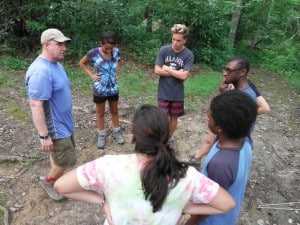Why You Should Help Support Outdoor Education
Life At NCOAEThe novelist, essayist, playwright, poet, and social critic James Baldwin said it best when he wrote: “We are responsible for the world in which we find ourselves, if only because we are the only sentient force which can change it.” Those words guide us here at The National Center for Outdoor & Adventure Education (NCOAE). Sure, we’re all about extreme adventures for teens and adults, along medical training for those interested in working in outdoor education and backcountry guiding, but at our core is a deep desire to help make the world a better place.
Through our values-based outdoor and adventure education curriculum, we’re able to foster an environment where personal growth and development flourish. But like most outdoor education programs fronted by amazing administrative staffers and outdoor educators and guides, we’re unable to do it entirely alone. That’s why — in addition to charging registration fees for our courses and trainings — we actively submit grant applications to foundations, seek gifts-in-kind, accept donations online, and encourage volunteers to share their time and expertise with our growing not-for-profit organization.
Sadly, most outdoor education programs would shutter if they had to survive on registration fees alone. It is only when registration revenue is combined with non-registration revenue (e.g., product sales) — and then augmented with grants and donations — that we find ourselves on solid financial footing.
With that in mind, we encourage you to consider outdoor education programs like NCOAE when planning your annual and seasonal giving. As we mentioned above, like many of the nation’s leading outdoor & adventure education programs, there are many ways to support what we do, including: (more…)
Getting to the Core of the NCOAE Curriculum, Part 2
NCOAE CurriculumIn Part 1 of this series, we told you about the unique curriculum offered here at The National Center for Outdoor & Adventure Education (NCOAE) and the fact that its focus is much more than just developing outdoor skills for our students and adult course participants.

In addition to teaching how to best use nimble feet and hands to ascend a rock face, or selecting the best route around a car-sized boulder in the middle of a fast-moving river, we also like to put the educational emphasis on humanism. And empathy. And self-analysis. To encompass these traits entails mastering the skills of leading, listening and learning.
So, for this — the second installation in our series of blog posts about the NCOAE curriculum — we begin to delve into each one of our 11 Ed Group topics. And we’re going to do that in depth. In fact, we’re going to cover these topics three at a time. That way, we can take our time, explain the topics, and not overwhelm anyone.
As a refresher, at NCOAE, “Ed Group” is short for Educational Group. Our wilderness programs expose course participants to a core curriculum built upon Self, Community, Action and Impact. We factor in 11 topics to be addressed during the daily Ed Groups, and these same 11 topics are revisited for reflection during evening Process Groups (known as “The Summit”). We also have Feelings Check Ins regularly. Each day — sometimes multiple times a day — we have the group circle up for a quick ‘Feelings Check In’, which in one or two words describes how one feels. For example, we typically have one Feelings Check In before starting an activity such as hiking or climbing.
Feelings Identification: Accurately identify our feelings is the foundation on which our curriculum is built upon. During the Feeling Identification group we establish a list of feeling words in order to have productive expression of feelings in the future. The long-term objective here is for folks to instinctively identify primary rather than secondary emotions. Here at NCOAE, we find that distinguishing between primary and secondary emotions is helpful when trying to resolve conflict, communicate personal needs, or manage risks. Here is the skinny on the two:
Imagine the layers of an onion. The inside is the core, where you often find the harder to pinpoint feelings such as (more…)
TALK TO US
Have any further questions about our courses, what you’ll learn, or what else to expect? Contact us, we’re here to help!